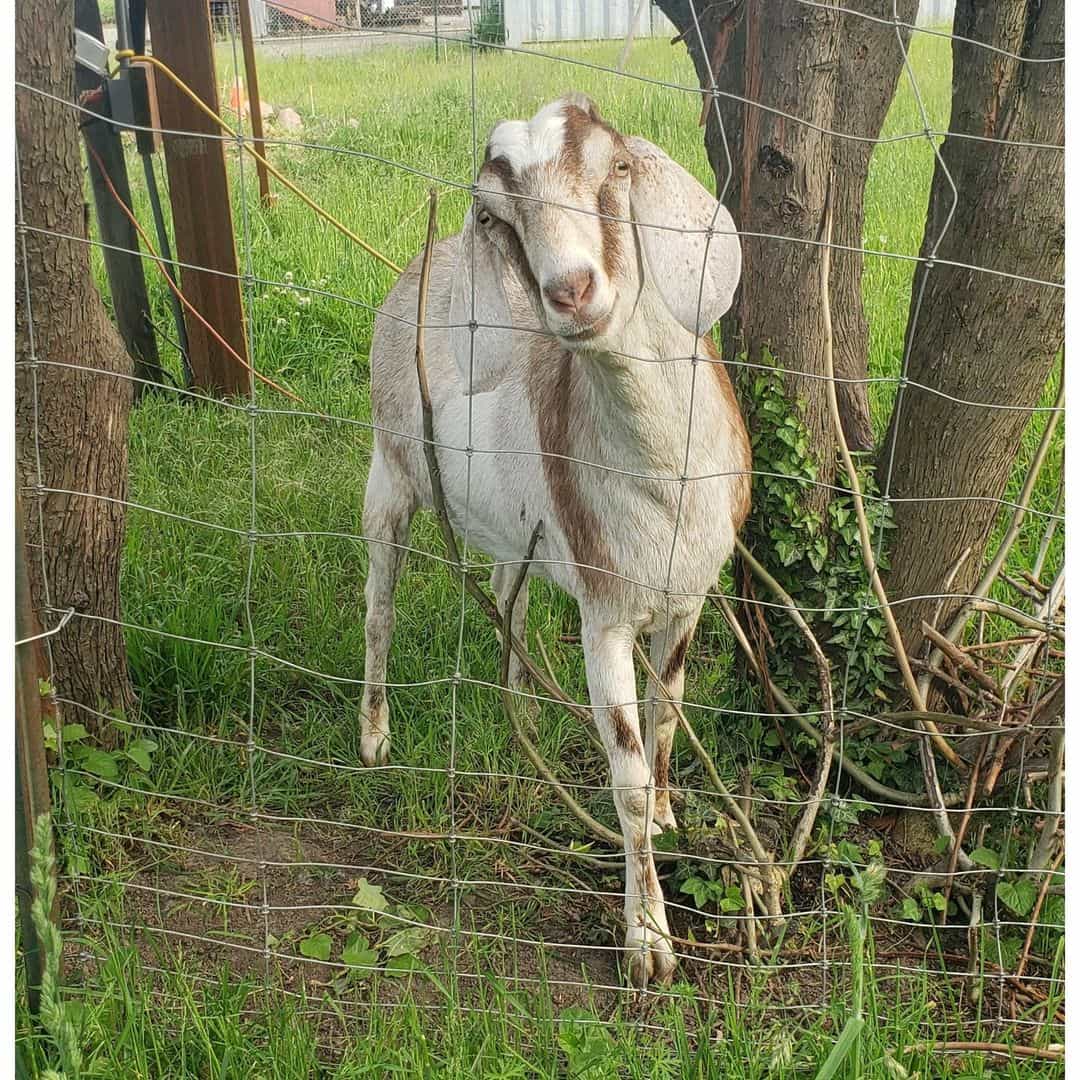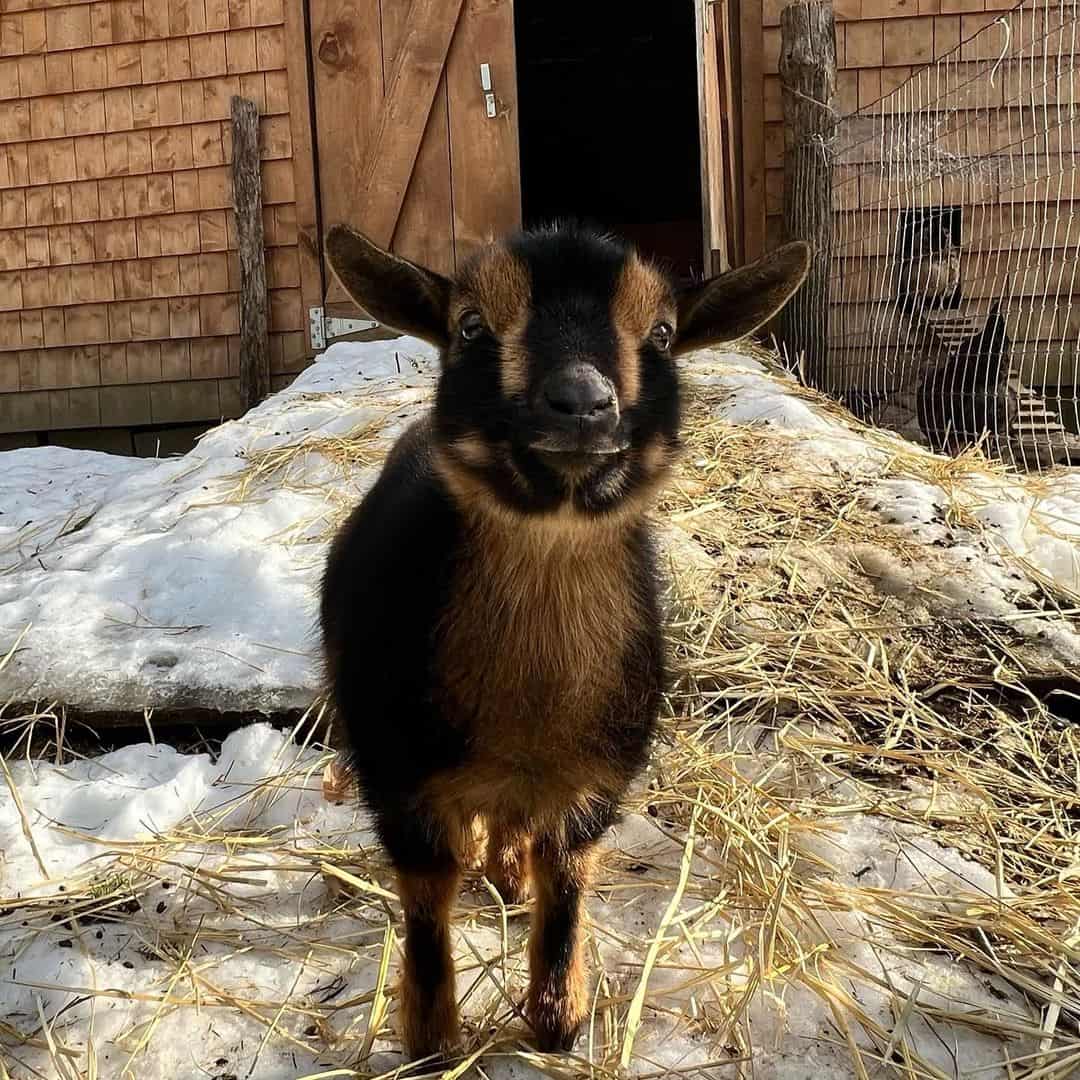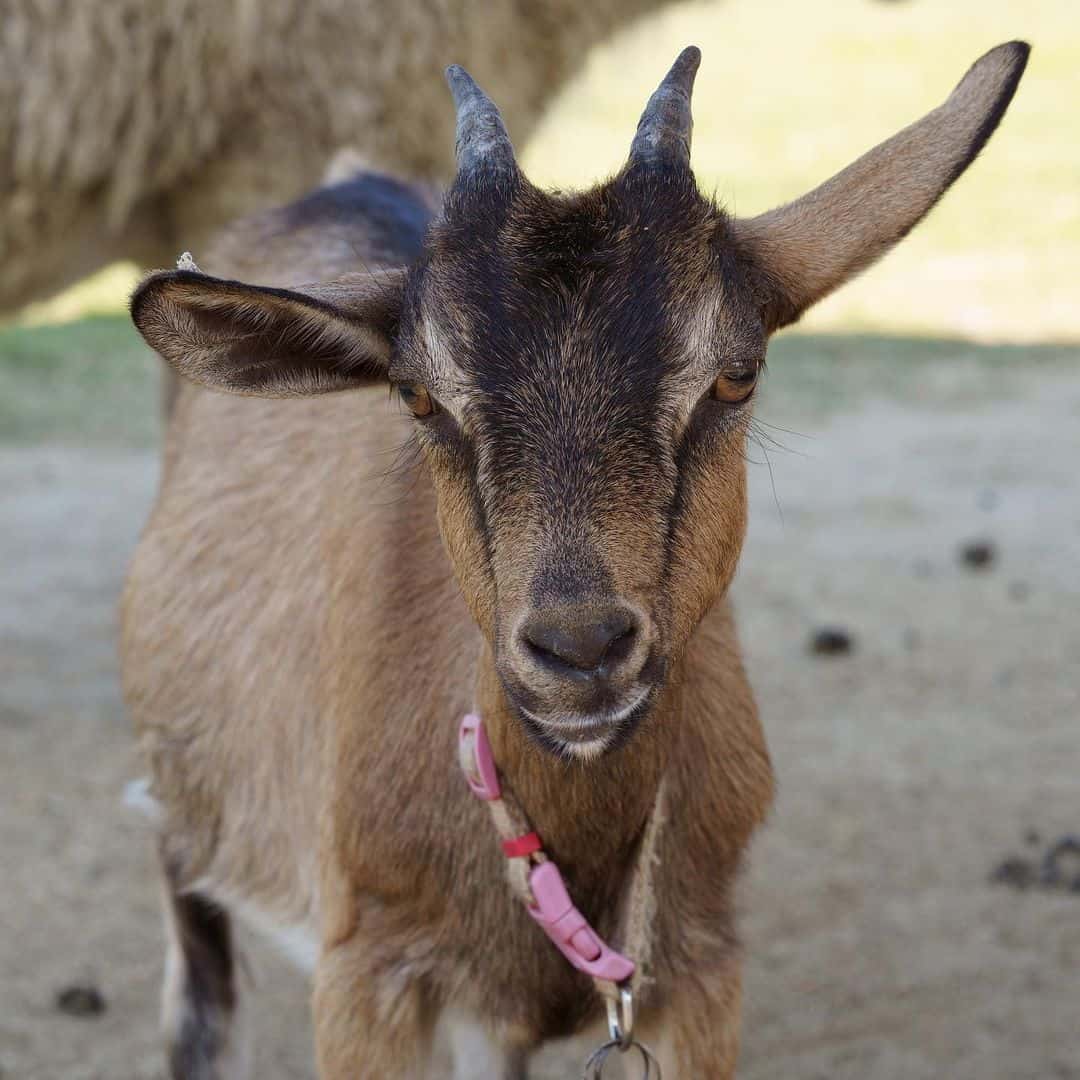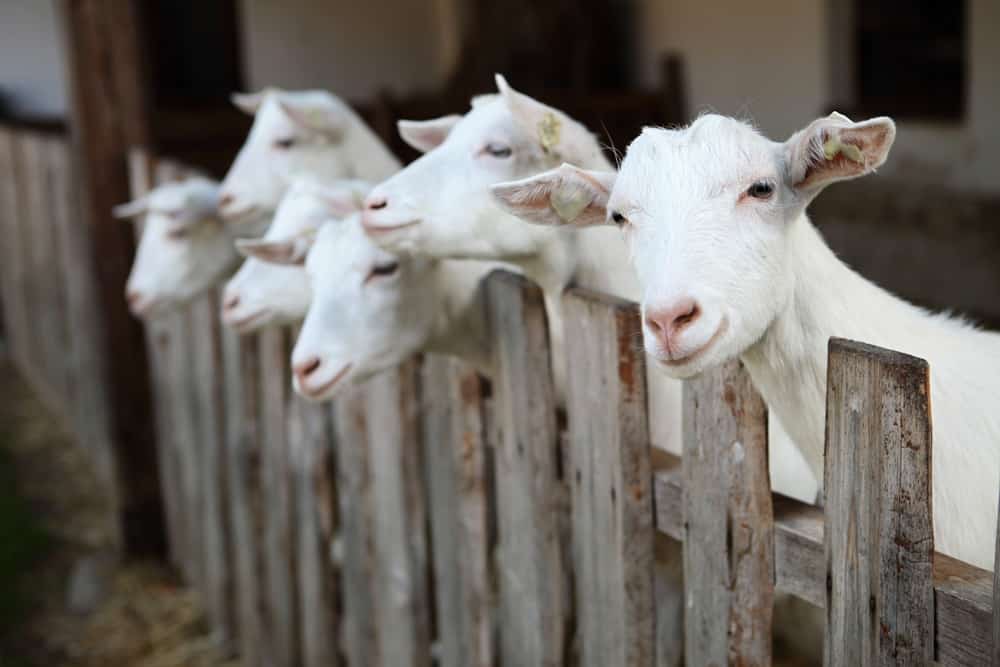Goats are fascinating animals and come in various colors, physical attributes, and sizes ranging from hefty Boer goats to mini Nubians and pygmy goats. The goat sound is called goat bleat, and it’s not limited to the baa or maa sound.
In this article, we’ll read about the different types of sounds goats make and their meaning and provide relevant information related to these cute billies.
General Goat Attributes

1. Diet
Goats are herbivores and spend most of their time grazing in open fields and eating different plants. While they eat most things green, goats can eat many other food items like fruits, vegetables, hay, and grains. Domesticated goats also require salt licks to keep their metabolism high and to digest food properly.
2. Size and Weight
They come in a variety of sizes. One of the smallest goats, the pygmy can weigh under 30 kilograms, whereas the larger-sized gots can go up to 150 kilograms.
While their size and weight might be different, all goats share similar characteristics, like having compact bodies, being lighter in weight than sheep, having hollow horns that typically face backward, and having a thick but short coat.
Selective breeding has resulted in several goat breeds, each with a distinct appearance and purpose. The colors also range from different shades of white, black, and brown and even include goats having multiple colors in one coat.
3. Reproduction
An adult female goat can ovulate once a month and carries the fetus in its womb for almost 150 days. While female goats always tend to their newborns, they cannot differentiate between their own baby or another goat’s kid.
What Different Sounds Do Goats Make?
The most common sound goats make is something to the effect of maa, meh, or baa. This sound is referred to as a bleating sound, similar to a sound a sheep makes. The term bleating is also used to represent other animal sounds like that of a calf, lamb, or deer.
These bucks have a range of different bleating sounds to assist them in expressing themselves to other goats, animals, and humans. When a goat is bleating, you can clearly sense a difference in the bleating pitch, depth, and volume. These different variations have different meanings.
Let’s explore further what these different sounds signify.
Meaning of Different Goat Sounds
1. Hunger and Thirst Sounds
Whether in the wild or domesticated in the barn, goats are peaceful animals and don’t bleat too often unless there are several issues.
The most common bleating sound is the vocalization when the goat is feeling hungry. This type of bleating is only seen in domesticated goats and is a call for assistance to the farmer taking care of them.
2. Alarm Sounds
If the goat senses danger or needs their caretaker desperately, you’ll hear a high-volume bleating sound, similar to the scream of a human when they are stuck in a desperate situation. If the pitch is also raised, it suggests there is a serious issue with your doe.
Goats can also alert other goats by making a snorting bleat.
3. Communicating with Goats
These nannies can convey something to other goats by making different bleating noises. They might be telling them about a patch of grass or want to share about a nearby water stream.
4. Goat Bleating When Mating
Like every other breed of animals, male and female goats undergo the mating process. Female and male goats make different bleating sounds to attract a mate.
Most males grumble when they see an attractive goat ready for mating. Some goats also make a low-pitched and deep bleat, representing their desire to find a mate.
5. Bleating When Lonely
Goats raised in herds always feel lonely when separated. If you have kept a few goats yourself, you already know that these lovely animals share a strong bond of love, affection, and trust with their caretaker.
When a goat is separated from the herd or is not cared for, the goat will feel lonely and make a screaming bleat.
6. Sounds Representing Anger
While any breed of goats knows how to use their horns when angry, they also make a snorting-type bleating sound that is similar to the bleating when the goat is alarmed.
The sound represents the goat is lonely and wants company. A solitary goat will bleat more from loneliness than several goats raised together.
Why Do Goats Make Loud Bleating Sounds?

Some common causes of loud bleating include hunger, illness, and thirst. Goats also make these sounds during pregnancy. All these sounds are different from each other and carry different meanings.
How to Stop Goats from Bleating?
It’s imperative to understand that caring for goats requires a lot of responsibility and time. If you are not sure you cannot provide adequate time or follow a schedule, it’s best to opt for another pet or livestock animal to raise.
Here’s what you can do to prevent goats from making a bleating sound.
Keep the goats properly fed and ensure they have a supply of clean drinking water. No matter how present you are with your goats, they develop a strong bond of affection with their caretaker and will bleat when they see the caretaker leave. This bleating sound will eventually stop as the goat accepts the new environment.
However, if the goat doesn’t stop bleating for longer periods, it can suggest an underlying disease.
Signs of a Sick Goat
Here are some common signs to notice if your goat is ill.
- Losing interest in eating or drinking.
- Constantly biting or kicking their stomach.
- Produce a green nasal discharge from the nose.
- The body temperature is either below 98 or above 103 degrees Fahrenheit.
- Grinding teeth too much.
- Breathing at a slow pace or fast breathing.
- Having diarrhea-like symptoms.
- Bleating during urination.
- Eyelids turn gray.
- Pressing the head against the wall.
- The goat feels low on energy and doesn’t follow their daily routine.
When to Get Help?
While you can always call in a vet if you see any of the signs we shared, there are three evident signs that suggest your goat needs adequate medical care immediately.
- A goat isolates itself, sits down for long periods, and is disoriented.
- Their stomachs are bloated.
- A goat lies down and stays there for long periods like a lifeless animal.
1. Common Infections
A common condition goats suffer from is urinary calculi which change the appearance and activeness of the goat. If your goat is suffering from this disease, it will lie down and start bleating whenever it gets up. Dull-looking fur, a shaky body, white-colored gums, and a hunched posture are signs of this disease.
Other common infections include E Coli and tetanus, which can become deadly when not treated properly. In an E Coli infection, the goat will experience symptoms of diarrhea and exhibit lethargic movements. Likewise, baby goats showing signs of diarrhea frequently are infected with a worm infection.
When a goat is affected with tetanus, the neck will become rigid and most likely circle around. If the mother goat has tetanus, it will be transferred to the newborn. Most babies born with tetanus have severe deformities and can only survive for a few weeks.
2. Visiting The Vet Is Crucial
Visiting the vet is crucial not only when you see signs of an illness but on regular days to keep their health in check. There are several vaccines that goats require to keep them thriving. Discuss with the vet how you can care for your goat’s health to get the best roadmap.
3. Provide Required Nutrients

Besides providing adequate care, it’s imperative to provide the goat with the required nutrients to keep them healthy and thriving.
You can mix fruits, vegetables, and grains into their diet. For example, if you feed your goat twice a day, give the goat small amounts of fruits and vegetables, and throw in a grain mix in grass or hay during the night to keep them fed.
When feeding goats, please remember that they can eat most food items you hand them or at least sample them. If you are feeding them copious amounts of food, however, your goat will eventually get sick. To be on the safe side, it’s best to consult your vet or a pet nutritionist to know which type of foods should be given and in what ratio.
FAQ
1. Does a Mountain Goat Make a Different Sound?
Unlike the domesticated goat, the mountain goat is a large animal and thrives in rugged conditions. Their bleating sound is different from the goat’s. These animals make a mewing sound.
2. Do Sheep and Goats Make the Same Sound?
As both animals share similar ancestors, their bleating sounds are also similar. Sheep make baa, maa, or bee sounds. While they make similar bleating sounds, these animals have different coats and varying physical attributes.
3. Do Baby Goats Bleat?
Right after birth, baby goats start making cute and sweet bleating sounds. The sounds can resemble what a cat or dog makes.
Final Thoughts
While goats can bleat all the time, their bleating increases during the breeding season. Paying attention to the depth, pitch, and volume of the bleat can assist you to identify different types of bleats.
If you are interested in exploring these different sounds, it’s best to listen to different sound recordings that can be easily searched over the internet.
